
 Research Assistant Professor
Research Assistant ProfessorThe Hong Kong Polytechnic University (PolyU)
Department of Computing (COMP), Faculty of Engineering
Office at PQ742, Mong Man Wai Building, Hung Hom, Kowloon, Hong Kong SAR.
SHORT BIO:
Dr. Xiangmeng Wang is currently a Research Assistant Professor of the Department of Computing (COMP), The Hong Kong Polytechnic University (PolyU), in collaboration with Prof. Qing Li.
She received her Ph.D. degree at the School of Computer Science, Faculty of Engineering and Information Technology, University of Technology Sydney (UTS) (2021-2025),
under the supervision of Prof. Guandong Xu.
Before that, She received her MSc degree in Computer Application Technology from Shanghai University (2017-2020).
Her research interests lie primarily in explainable artificial intelligence, data analysis, and causal machine learning.
Her papers have been published in top-tier conferences and journals in the field of machine learning Google Scholar.
RESEARCH INTERESTS:
Data Mining, Artificial Intelligence, Social Computing, with a particular focus on:
Warning
Problem: The current name of your GitHub Pages repository ("Solution: Please consider renaming the repository to "
http://".
However, if the current repository name is intended, you can ignore this message by removing "{% include widgets/debug_repo_name.html %}" in index.html.
Action required
Problem: The current root path of this site is "baseurl ("_config.yml.
Solution: Please set the
baseurl in _config.yml to "Education
-
 University of Technology Sydney (UTS)Faculty of Engineering and Information Technology
University of Technology Sydney (UTS)Faculty of Engineering and Information Technology
Doctor of Philosophy (Analytics)Mar. 2021 - Mar. 2025 -
 Shanghai UniversityMaster of Engineering (Computer Application Technology)Sep. 2017 - Jul. 2020
Shanghai UniversityMaster of Engineering (Computer Application Technology)Sep. 2017 - Jul. 2020
Honors & Awards
-
National Scholarship from Ministry of Education of China2019
-
National Scholarship, National Encouragement Scholarship2016
-
Distinguished Graduate Student2017
-
Distinction in the 2023 HDR Excellence Awards from UTS2023
-
Nominated by UTS for Apple Scholar and Google PhD Fellowship competition2023
News
Selected Publications (view all )
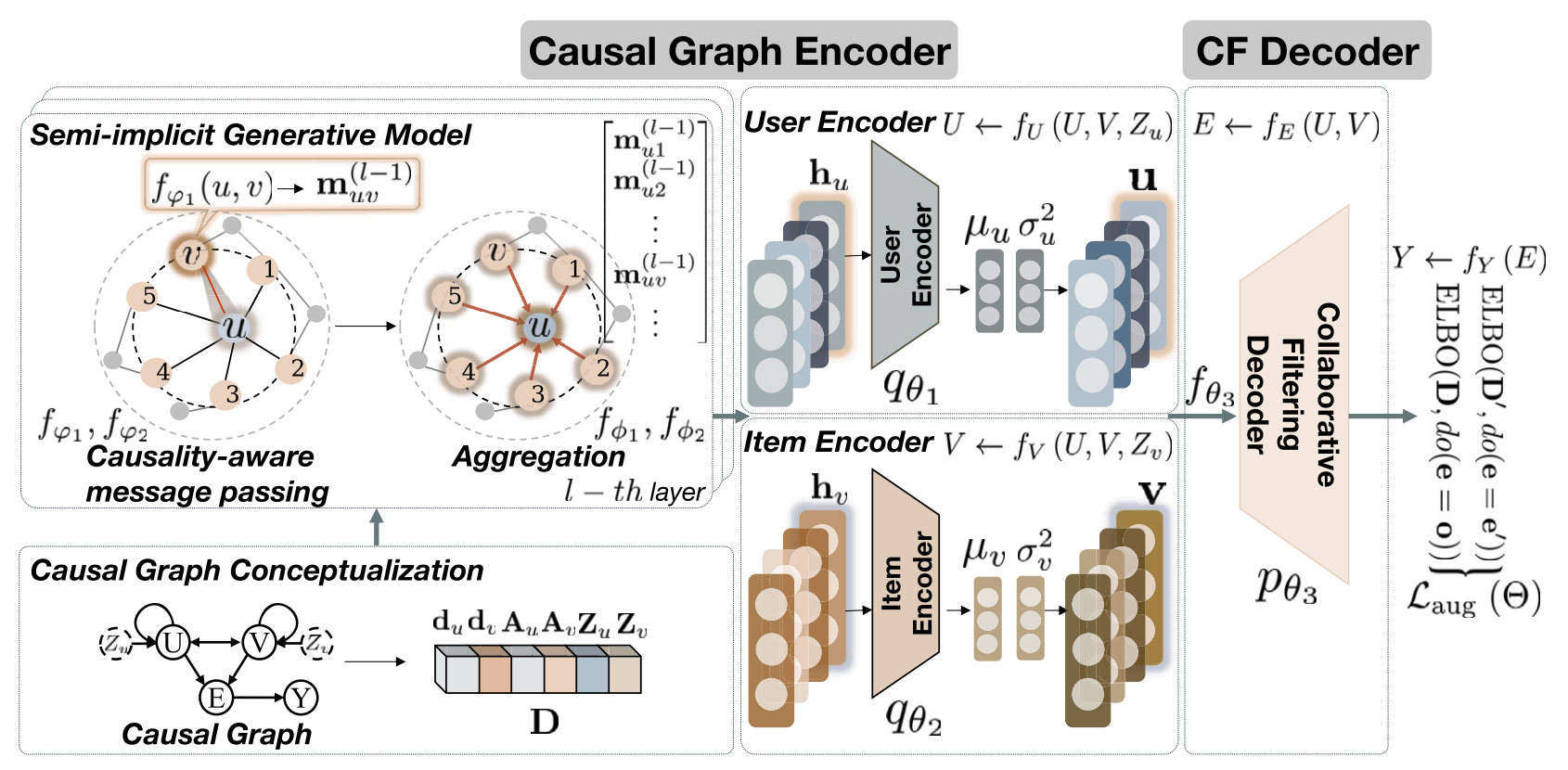
Neural causal graph collaborative filtering
Xiangmeng Wang, Qian Li, Dianer Yu, Wei Huang, Qing Li, Guandong Xu
Information Sciences 2024
In this work, we propose integrating causal modeling with the learning process of GCN-based GCF models, leveraging causality-aware graph embeddings to capture complex dependencies in recommendations.
Neural causal graph collaborative filtering
Xiangmeng Wang, Qian Li, Dianer Yu, Wei Huang, Qing Li, Guandong Xu
Information Sciences 2024
In this work, we propose integrating causal modeling with the learning process of GCN-based GCF models, leveraging causality-aware graph embeddings to capture complex dependencies in recommendations.
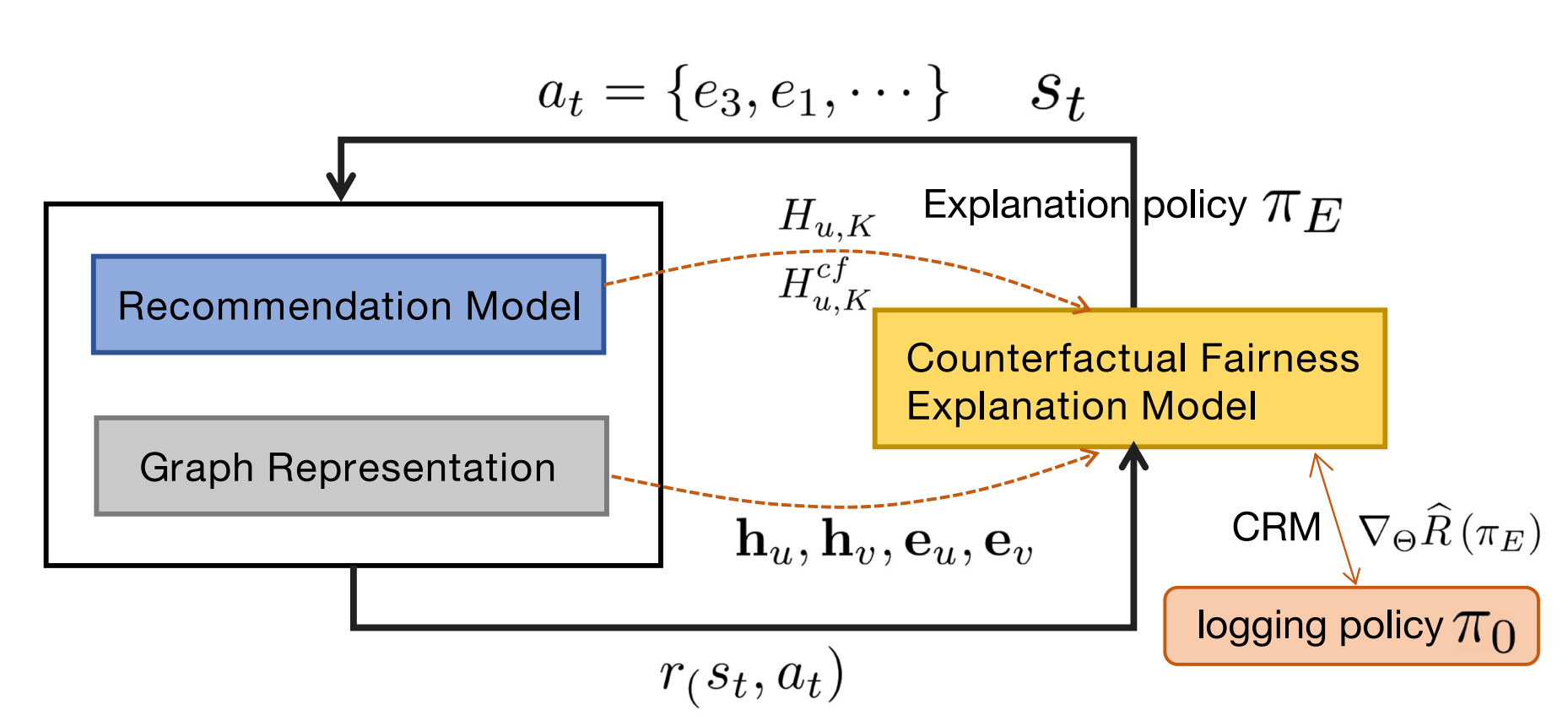
Counterfactual explanation for fairness in recommendation
Xiangmeng Wang, Qian Li, Dianer Yu, Qing Li, Guandong Xu
ACM Transactions on Information Systems 2024
In this work, we adopt counterfactual explanations from causal inference and propose to generate attribute-level counterfactual explanations, adapting to discrete attributes in recommendation models.
Counterfactual explanation for fairness in recommendation
Xiangmeng Wang, Qian Li, Dianer Yu, Qing Li, Guandong Xu
ACM Transactions on Information Systems 2024
In this work, we adopt counterfactual explanations from causal inference and propose to generate attribute-level counterfactual explanations, adapting to discrete attributes in recommendation models.
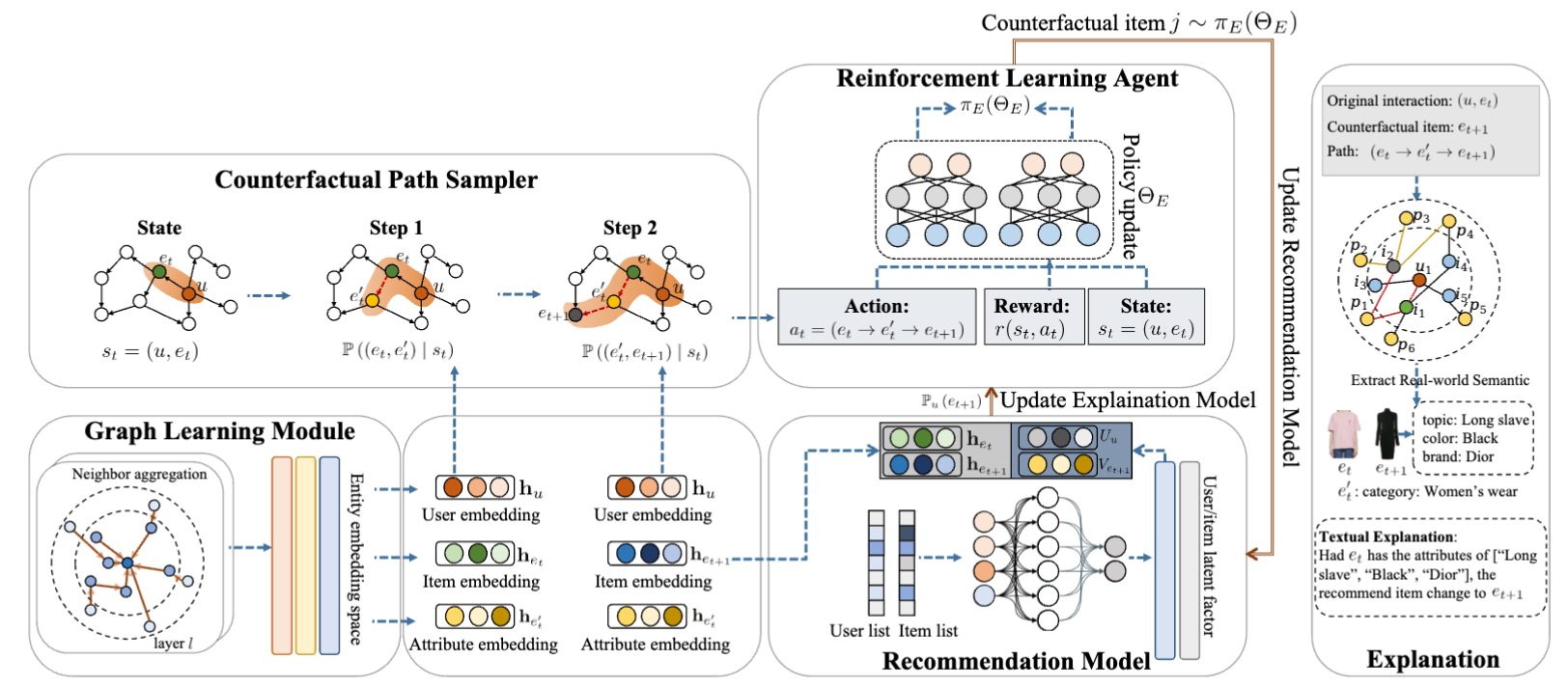
Reinforced path reasoning for counterfactual explainable recommendation
Xiangmeng Wang, Qian Li, Dianer Yu, Qing Li, Guandong Xu
IEEE Transactions on Knowledge and Data Engineering 2024
We propose a novel Counterfactual Explainable Recommendation (CERec) to generate item attribute-based counterfactual explanations meanwhile to boost recommendation performance.
Reinforced path reasoning for counterfactual explainable recommendation
Xiangmeng Wang, Qian Li, Dianer Yu, Qing Li, Guandong Xu
IEEE Transactions on Knowledge and Data Engineering 2024
We propose a novel Counterfactual Explainable Recommendation (CERec) to generate item attribute-based counterfactual explanations meanwhile to boost recommendation performance.
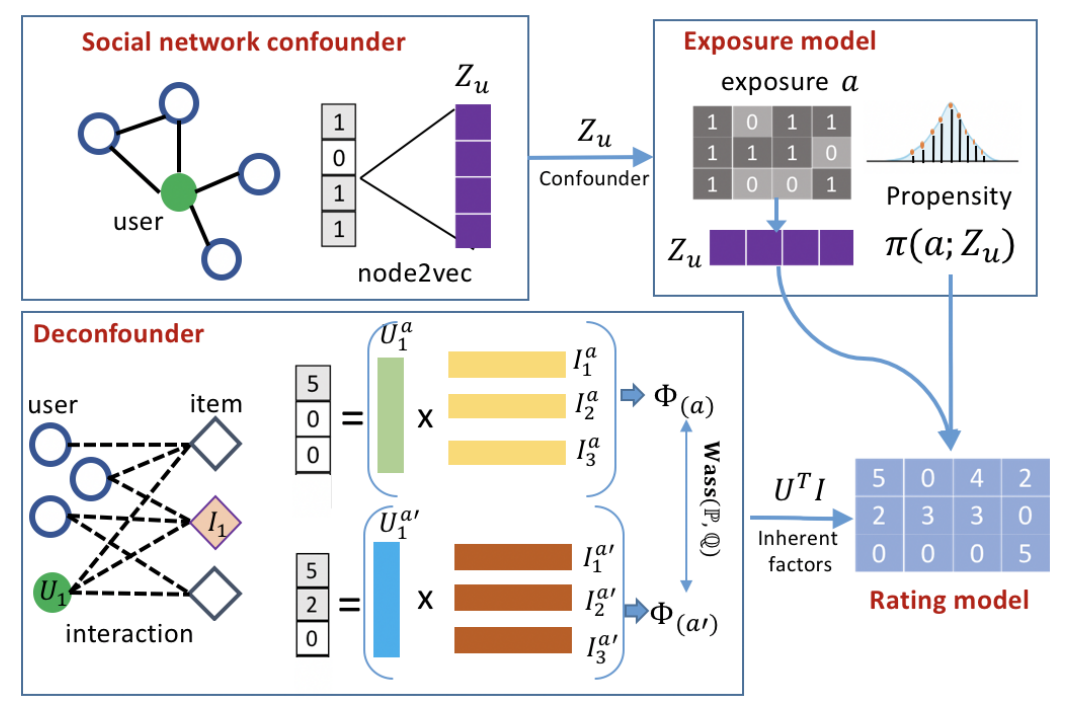
Be causal: De-biasing social network confounding in recommendation
Qian Li*, Xiangmeng Wang*, Zhichao Wang, Guandong Xu (* equal contribution)
ACM Transactions on Knowledge Discovery from Data 2023
Little research has been done to reveal how the ratings are missing (Missing-Not-At-Random problem) from a causal perspective. To bridge the gap, we propose an unbiased and robust method called DENC (De-Bias Network Confounding in Recommendation), inspired by confounder analysis in causal inference.
Be causal: De-biasing social network confounding in recommendation
Qian Li*, Xiangmeng Wang*, Zhichao Wang, Guandong Xu (* equal contribution)
ACM Transactions on Knowledge Discovery from Data 2023
Little research has been done to reveal how the ratings are missing (Missing-Not-At-Random problem) from a causal perspective. To bridge the gap, we propose an unbiased and robust method called DENC (De-Bias Network Confounding in Recommendation), inspired by confounder analysis in causal inference.

MGPolicy: Meta Graph Enhanced Off-policy Learning for Recommendations
Xiangmeng Wang, Qian Li, Dianer Yu, Zhichao Wang, Hongxu Chen, Guandong Xu
the 45th International ACM SIGIR Conference on Research and Development in Information Retrieval (SIGIR) 2022
This paper proposes a framework termed meta graph enhanced off-policy learning (MGPolicy), which is the first recommendation model for correcting the off-policy bias via contextual information.
MGPolicy: Meta Graph Enhanced Off-policy Learning for Recommendations
Xiangmeng Wang, Qian Li, Dianer Yu, Zhichao Wang, Hongxu Chen, Guandong Xu
the 45th International ACM SIGIR Conference on Research and Development in Information Retrieval (SIGIR) 2022
This paper proposes a framework termed meta graph enhanced off-policy learning (MGPolicy), which is the first recommendation model for correcting the off-policy bias via contextual information.

Off-policy learning over heterogeneous information for recommendation
Xiangmeng Wang, Qian Li, Dianer Yu, Guandong Xu
the ACM Web Conference 2022 2022
We are the first to propose a novel off-policy learning augmented by meta-paths for the recommendation. We argue that the Heterogeneous information network (HIN), which provides rich contextual information of items and user aspects, could scale the logged data contribution for unbiased target policy learning.
Off-policy learning over heterogeneous information for recommendation
Xiangmeng Wang, Qian Li, Dianer Yu, Guandong Xu
the ACM Web Conference 2022 2022
We are the first to propose a novel off-policy learning augmented by meta-paths for the recommendation. We argue that the Heterogeneous information network (HIN), which provides rich contextual information of items and user aspects, could scale the logged data contribution for unbiased target policy learning.
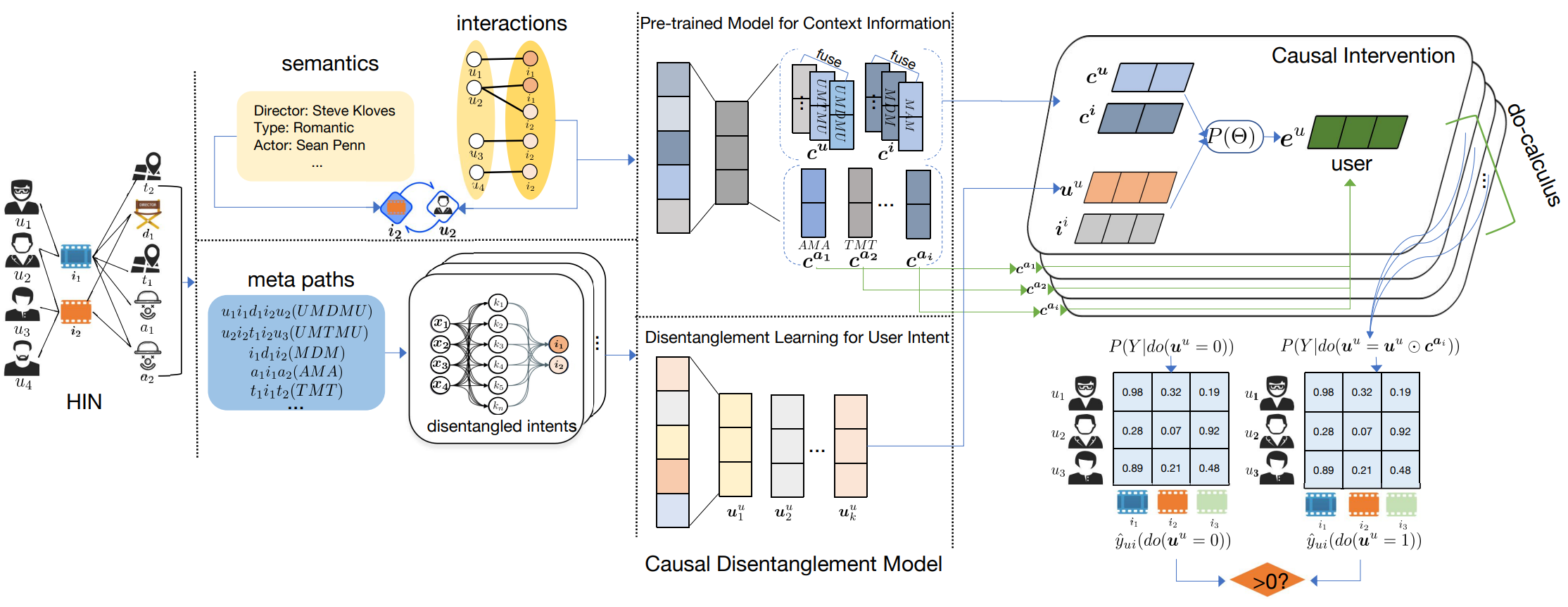
Causal disentanglement for semantic-aware intent learning in recommendation
Xiangmeng Wang, Qian Li, Dianer Yu, Peng Cui, Zhichao Wang, Guandong Xu
IEEE Transactions on Knowledge and Data Engineering 2022
The first to propose an unbiased and semantic-aware disentanglement learning called CaDSI (Causal Disentanglement for Semantics-Aware Intent Learning) from a causal perspective. Particularly, CaDSI explicitly models the causal relations underlying recommendation task, and thus produces semantic-aware representations via disentangling users’ true intents aware of specific item context.
Causal disentanglement for semantic-aware intent learning in recommendation
Xiangmeng Wang, Qian Li, Dianer Yu, Peng Cui, Zhichao Wang, Guandong Xu
IEEE Transactions on Knowledge and Data Engineering 2022
The first to propose an unbiased and semantic-aware disentanglement learning called CaDSI (Causal Disentanglement for Semantics-Aware Intent Learning) from a causal perspective. Particularly, CaDSI explicitly models the causal relations underlying recommendation task, and thus produces semantic-aware representations via disentangling users’ true intents aware of specific item context.